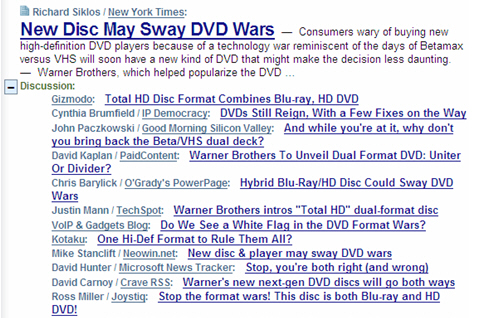Daylife's rather lifeless news aggregator

I am an unabashed TechMeme fan. For some kinds of stories (mostly Internet, consumer tech and Web 2.0 related), TechMeme provides a one-page, aggregated, filtered, archiveable summary in near real-time of what is new and generating conversation. It is based on Gabe Rivera's proprietary algorithms and more than 600 home cooked rules. TechMeme's accuracy, clustering, timeliness and scannability make it an essential service, and I have tried other meme trackers, including TailRank, Reddit (acquired by Wired) and Megite.

With my prejudice declared, I tried out Daylife, the latest meme tracking entrant, attempting to create order from news and commentary chaos. It is far more ambitious than TechMeme and its brethren. In fact, it's more reasonable to classify Daylife as an automated news aggregator in the tradition of Google News, NewsVine, Topix and Inform.
Daylife is organized by large-grained topics, such as World, Business, Celebrity, Politics, Technology, Science and Sports (Rivera has separate meme trackers for politics, celebrity dirt and baseball so far) and also has more granular news clusters, such as Iraq or Apple Computer.
Daylife also has clustering around people, organizations and places, as well as photos and pull quotes, and more cross-connecting of content. For example, a story on John Negroponte going from head of U.S. intelligence to the State Department is fleshed out with people, organizations, places, quotes and photos relevant to the topic. Exposing multiple dimensions is useful but not as important as making the information highly scannable, which is what TechMeme and its sister sites do well, for time-starved readers with continuous partial attention.
The Daylife site seems to be designed around forcing lots of clicks to get around (currently the site has not ads), which is evident in lack of AJAX pixie dust to ease navigation and needless clicking. Nor are there RSS feeds or any social elements (comments, ranking, etc.) to engage and inspire a community.
Out of the gate, Daylife is slow, pages are not loading fast. It also segregates traditional news and blogs. I would prefer the news and blogs clustered together and ranked based on link structure and other collaborative filtering mechanisms that help bring the best content to the top of the heap. Daylife does have a mechanism for eliminating redundant entries to reduce the overload and offers a place to store clips.
The topic pages, such as for Apple Computer, appear to be search result pages. Only a few of the stories were from blogs, which is a major omission, given some of the best information on Apple is generated by the blogosphere. In addition, the search page lacks navigation to the top-level topic areas, such as Technology and Politics.
Of course, Daylife is still in a beta phase and has many smart people (see PaidContent's coverage on the impressive list of investors) associated with the startup who might want to offer some advice. We'll see in the coming weeks whether Daylife finds sufficient day light to survive.
TechCrunch's Mike Arrington, an investor in Daylife, doesn't have much good to say about the news aggregator.